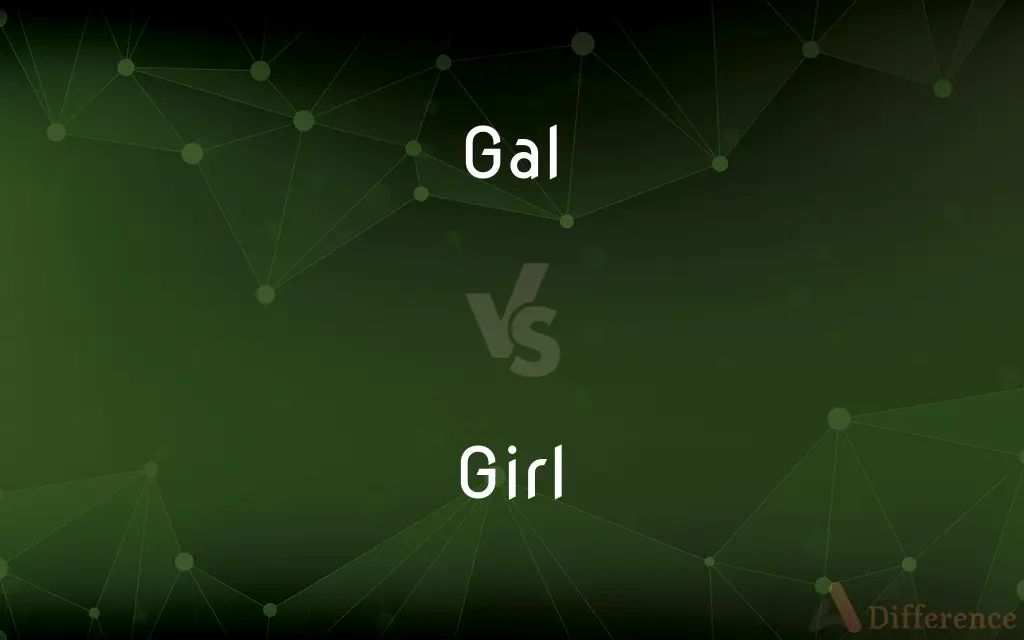Gal vs. Girl — What's the Difference?
By Tayyaba Rehman & Maham Liaqat — Updated on February 28, 2024
Gal is a casual, often colloquial term for a woman or girl, suggesting informality and friendliness, while girl refers to a female child or young woman, with a more neutral tone.

Difference Between Gal and Girl
Table of Contents
ADVERTISEMENT
Key Differences
Gal, originating from slang, conveys a sense of casualness and approachability when referring to a woman or girl. It's often used in informal contexts or speech, embodying a laid-back and friendly attitude. Girl, on the other hand, is a more formal and widely accepted term that denotes a female child or young woman. Its usage spans from everyday conversations to more formal writings, covering a broad age range from infancy to late teens.
The choice between gal and girl can also reflect the speaker's cultural background or the regional dialect. Gal is more prevalent in certain English-speaking regions, carrying with it a flavor of local vernacular.
"Gal" might be used to foster a sense of camaraderie or familiarity, whereas "girl" is more universally understood and can be employed in both casual and formal settings without much concern for misinterpretation.
The perception of these terms can vary with the audience. Some may view "gal" as endearing or empowering, while others might find it outdated or informal. Conversely, "girl" is sometimes criticized when used to refer to women, as it can be seen as belittling or diminishing their maturity.
Comparison Chart
Definition
A casual term for a woman or girl.
A term for a female child or young woman.
ADVERTISEMENT
Tone
Informal, friendly.
Neutral, widely applicable.
Usage Context
Casual conversations, informal settings.
All contexts, from casual to formal.
Age Range
Broad, can refer to any age but often young to middle-aged women.
Primarily infants to late teens, occasionally young lady.
Connotation
Can imply a sense of camaraderie or informality.
More formal, can sometimes imply youth or immaturity.
Compare with Definitions
Gal
Informal way to refer to a woman, especially in groups.
All the gals from work are here.
Girl
A female child or teenager.
The girl is only eight years old.
Gal
A friendly term for any female.
The gals are meeting up for coffee.
Girl
In contexts of familial relationships.
She's the girl of the family.
Gal
Slang for a female friend or companion.
She's my best gal.
Girl
A young woman, often unmarried.
The girls are going out tonight.
Gal
Used in expressions of camaraderie.
You're a tough gal!
Girl
Referring to a female who is young at heart.
My grandmother is a girl at heart.
Gal
Casual reference to a young woman.
That gal over there is looking for you.
Girl
Used to denote female offspring.
They have two girls and a boy.
Gal
A woman or girl.
Girl
A girl is a young female human, usually a child or an adolescent. When a girl becomes an adult, she is accurately described as a woman.
Gal
(colloquial) A young woman.
Girl
A woman socializing with a group of women
A night out with the girls.
Gal
Alliterative term for girl (or woman)
Girl
A woman, especially a young and often attractive woman.
Girl
A young woman;
A young lady of 18
Girl
A youthful female person;
The baby was a girl
The girls were just learning to ride a tricycle
Girl
A female human offspring;
Her daughter cared for her in her old age
Girl
A girl or young woman with whom a man is romantically involved;
His girlfriend kicked him out
Girl
A friendly informal reference to a grown woman;
Mrs. Smith was just one of the girls
Common Curiosities
Which term is more formal, "gal" or "girl"?
"Girl" is more formal and universally applicable.
Which term is better for a group of female friends?
"Gals" can imply camaraderie; "girls" is more neutral.
Is "gal" widely used today?
Its usage varies by region and generation, more common in casual, friendly contexts.
Can "gal" be used in professional settings?
Typically, it's too informal for professional contexts.
Can the use of "gal" be seen as empowering?
Yes, depending on context and the speaker's intent.
Is "gal" considered disrespectful?
Not inherently, but context and tone matter; it's casual and friendly.
Can "girl" be used for women?
Yes, but it's important to consider context as it may imply youth or immaturity.
Do "gal" and "girl" have the same connotations?
No, "gal" is more informal and friendly, while "girl" is neutral and more formal.
Can men be referred to as "gals"?
Traditionally, no; "gal" specifically refers to females.
How do regional dialects affect the use of "gal"?
Its usage and acceptance can vary greatly by region.
Are there any synonyms for "gal" that carry the same casual tone?
Terms like "lady" or "woman" can be used casually, but "gal" has a unique informality.
Is there an age limit for calling someone a "girl"?
"Girl" usually refers to females from infancy to late teens, but context matters.
How do cultural perceptions influence the choice between "gal" and "girl"?
Cultural background and the audience's sensibilities play a significant role.
Is it appropriate to use "girl" for professional women?
Typically, more specific terms like "woman" or professional titles are preferred.
How has the usage of "gal" evolved over time?
Its popularity has fluctuated, with some regions and generations embracing it more than others.
Share Your Discovery

Previous Comparison
Persecution vs. Tribulation
Next Comparison
Focusing vs. FocussingAuthor Spotlight
Written by
Tayyaba RehmanTayyaba Rehman is a distinguished writer, currently serving as a primary contributor to askdifference.com. As a researcher in semantics and etymology, Tayyaba's passion for the complexity of languages and their distinctions has found a perfect home on the platform. Tayyaba delves into the intricacies of language, distinguishing between commonly confused words and phrases, thereby providing clarity for readers worldwide.
Co-written by
Maham Liaqat













































